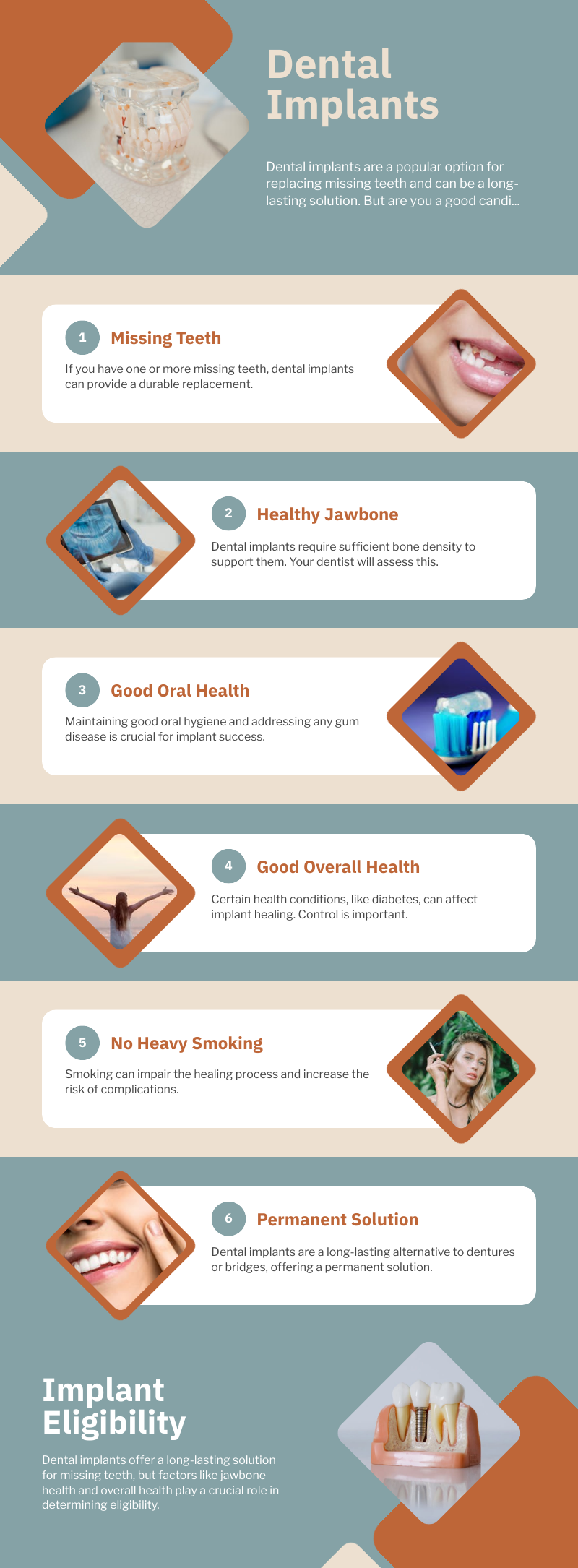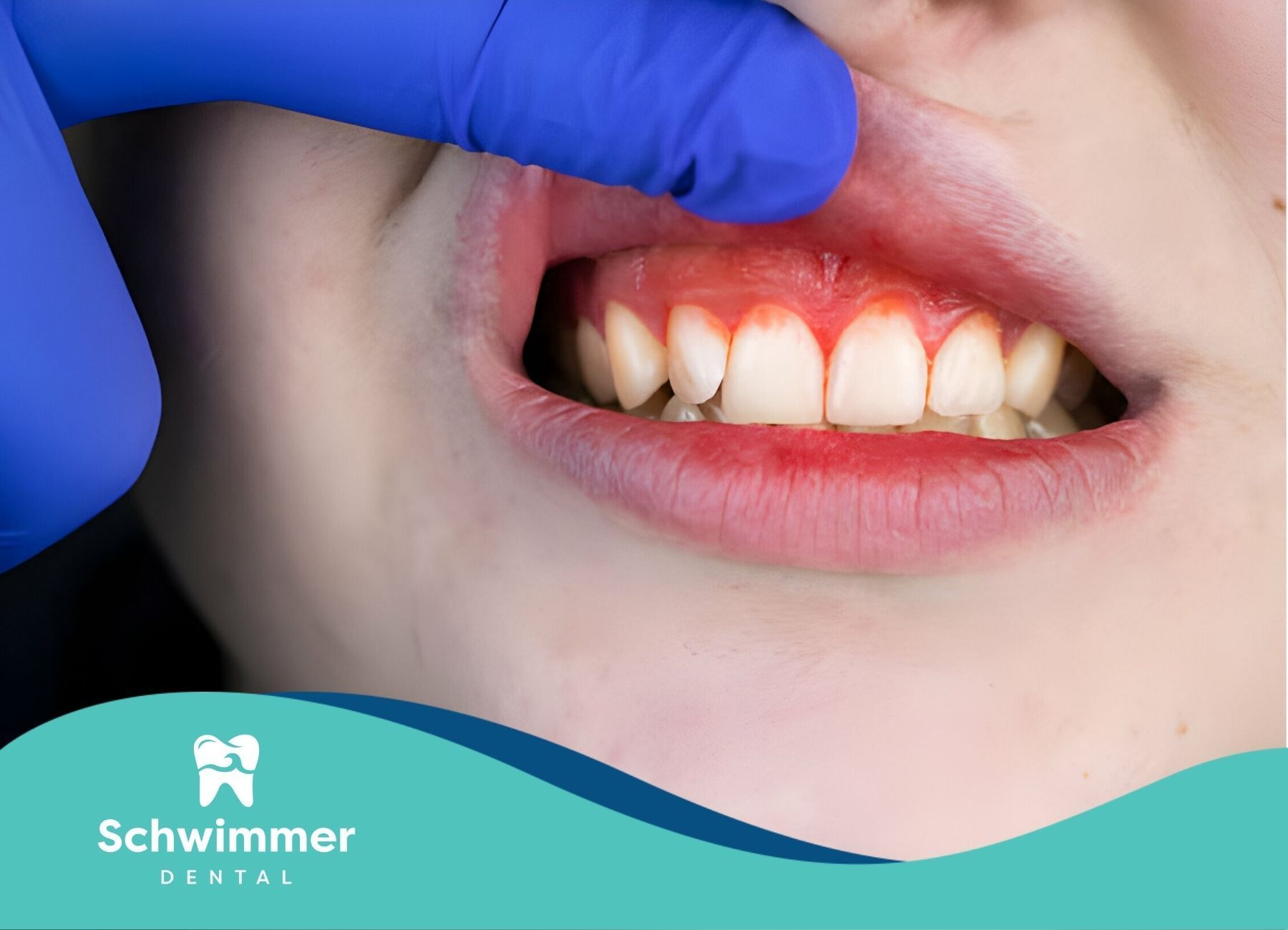Who Can Have Dental Implants? Understanding Eligibility
Dental implants have changed the way we replace teeth. They give a lasting option for restoring smiles and improving your quality of life. Unlike removable dentures, dental implants join with the jawbone. This gives them great stability and a natural feel. However, not everyone is a perfect fit for this treatment.
Having good oral hygiene, enough bone density, and good overall health is important. These factors help decide if someone can get dental implants. This blog will talk about who can benefit from dental implants and gain the confidence that comes with a new smile.
Identifying Eligible Candidates for Dental Implants
Determining if you can get dental implants means looking closely at your mouth and overall health. Dentists check for several important things to ensure the implants will be successful and last a long time. While these needs might change a bit for each person, knowing the basic guidelines can help you understand how eligibility works.
First, you need enough jawbone to support the implant. Your gums must be healthy and free from periodontal disease. It's also important to have
good oral hygiene. Your general health is key, too. Some medical conditions, like uncontrolled diabetes, can impact how well dental implants work.
1. Adults with Fully Grown Jawbones
The key to a successful dental implant is having a fully grown jawbone. The implant procedure requires placing a titanium post into the jawbone. This post acts as the root of the artificial tooth. The jawbone may not hold the implant well if it isn't fully developed. This can lead to complications and lower the chances of osseointegration.
Osseointegration is the process where the dental implant bonds with the bone around it. This creates a strong bond that lasts. Adults with fully grown jawbones are usually good candidates for dental implants. Their bone structure provides a solid foundation for the implant procedure.
2. Individuals with Sufficient Bone Density
Good jawbone is important. Having enough bone density is just as important for a successful dental implant. Bone density means how much mineral matter is in the bone. This affects how strong it is and how well it can support the implant.
If someone has low bone density, often from tooth loss, gum disease, or some medical conditions, it can make the implant less stable. It can also slow down osseointegration, which is when the implant fuses with the bone.
In these situations, bone grafting may be needed before the dental implant surgery. Bone grafting adds bone to the area with low density. It helps to bring back enough volume and density for the dental implant placement to go well.
3. Non-Smokers or Willing to Quit Smoking
Smoking is very bad for your health, especially for your mouth and the success of dental implants. Nicotine and other harmful chemicals in cigarettes make it hard for blood and oxygen to flow to your gums and jawbone. This flow is important for healing after surgery. Because of this, smokers are at a much higher risk of problems, slow healing, and even losing their implants.
If you smoke and are thinking about getting dental implants, it is important to quit smoking. This can help you have a better chance of success. Your dentist will probably tell you to stop smoking for some time before and after the surgery. This will help with healing and reduce the risk of complications.
4. People without Chronic Oral Diseases
Maintaining good oral health is very important for anyone thinking about getting dental implants. Chronic mouth diseases, especially periodontal disease, can greatly affect if someone is suitable for implants. Periodontal disease is a bacterial infection that harms the gums and the bone that supports the teeth. This can harm the nearby tissues and bone.
When there is an active infection and inflammation, it can disrupt the healing process, slow down osseointegration, and raise the chance of implant failure. Addressing any oral health issues, like gum disease, is essential before getting dental implants. This helps create a healthy base for the implants and ensures they will be successful in the long run.
5. Patients with Good Oral Hygiene Practices
A commitment to good oral hygiene is very important during and after the dental implant process. Just like natural teeth, dental implants need to be in a clean and healthy environment. Good oral care includes regular brushing, flossing, and dental check-ups. This helps prevent plaque buildup and keeps your gums and surrounding tissues healthy.
Keeping up with proper oral hygiene helps you heal well after implant surgery. It also supports the long-term health and life of your dental implants. By making good oral hygiene a part of your daily routine, you help your dental implant treatment succeed. This way, you can enjoy your restored smile for many years.

Exploring Health Conditions Affecting Eligibility
Good oral health is very important if you want a dental implant. However, some medical conditions can affect your eligibility and treatment's effectiveness. These conditions can delay healing, decrease bone density, or increase complications. Knowing how health issues may affect dental implants is key.
Talking with your dentist and your primary care doctor helps you get a complete look at your overall health. This allows you to make informed choices about getting an implant. Sharing your medical history helps dental professionals recognize risks and adjust the treatment plan if needed.
1. Impact of Diabetes on Implant Success
Diabetes is a condition that affects how the body controls blood sugar. It can also make it harder for the body to heal and may affect how well dental implants work. When diabetes is not managed well, it can lead to poor blood flow and a weak immune system. This increases the chances of getting infections and can slow down healing after any surgery, including dental implant surgery.
Patients with diabetes who want dental implants should focus on keeping their blood sugar levels under control before and after the surgery. This helps lower the risk of complications. It is important to regularly check blood sugar levels and talk with a medical professional to help ensure good healing and the long-term success of the implant.
2. Osteoporosis and Its Influence on Dental Implants
Osteoporosis is a condition that leads to weak and brittle bones. This can make placing dental implants difficult. Dental implants need a strong jawbone to hold them in place. So, people with osteoporosis might not have enough bone density for a successful fit.
In these cases, bone grafting can help. This process adds bone material to the jawbone to provide a strong base for the implant. Depending on how serious the bone loss is, your dentist may suggest seeing an oral surgeon. This specialist knows a lot about bone grafting and can help find the best solution for you.
When considering dental implants, it’s important to consult a trusted professional who can evaluate your specific needs and oral health. With technological advancements and personalized care, finding dental implants near me has become more convenient than ever.
Local dental practices now offer comprehensive consultations to determine whether you’re a suitable candidate, taking into account factors such as bone density, gum health, and overall wellness. Whether you’re replacing a single tooth or exploring full-mouth restoration, dental implants provide a durable and natural-looking solution tailored to your lifestyle.
Conclusion
In conclusion, taking care of the eligibility for dental implants is important. It includes factors like jawbone maturity, bone density, and good oral health habits. Overall, health issues like diabetes and osteoporosis matter, too. If you do not smoke or are ready to stop, that helps as well. If you qualify, dental implants can change your life if you have missing teeth.
It’s best to talk to a dental professional. Schwimmer Dental is renowned as one of New Jersey’s top dental providers, offering exceptional care tailored to every patient’s unique needs. With advanced technology and a compassionate team, Schwimmer Dental ensures a seamless dental implant journey, from initial consultation to the final restoration. Our expertise in implant dentistry makes them a trusted choice for those seeking lasting solutions to missing teeth.
Frequently Asked Questions
Can Age Affect My Eligibility for Dental Implants?
Age alone does not prevent you from being a good candidate for dental implants. If you have healthy gums and enough bone to support them, along with being in good overall health, your dentist can talk to you about getting dental implants. It is best to consult with a general dentist who has experience with implant placement for guidance on what's just right for you.
What if I Have Gum Disease?
Gum disease, known as periodontal disease, must be treated before thinking about dental implant placement. It's important to talk to an oral surgeon or periodontist to clear up the infection and make sure the implant site is healthy. After your gums are healthy, you can discuss dental implant placement with your dentist.



